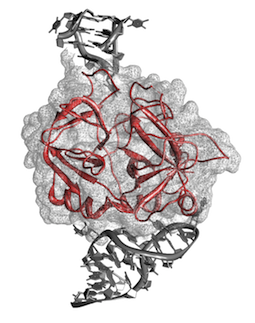Research highlights
We study biomolecules for modern problems in biology and bio-hybrid nanotechnologies. To this end, we conjugate the use of traditional simulation tools, like molecular dynamics and quantum chemistry, and the development of innovative approaches dedicated to bio/bio-hybrid molecules.
The long term goal of our research is to be able to use computers to run in silico experiments to facilitate the design of therapies and the integration of biomolecules in nanotechnologies.
To achieve this goal, we use a variety of different "traditional" approaches (both classical and quantum mechanical analysis) and actively work on developing new simulation methods. In particular, we keep implementing algorithms derived from the Static Mode method, developped during during my PhD thesis. This approach enables custom in silico experiments and offers a new role to simulation in close relation to experiment.
More specifically, our recent simulation topics focus on the stuctural and biomechanical properties of Ras mutations for Structural Oncology. We also work on various bio-hybrid molecules for nanobiotechnology purpose, mainly motor proteins for the integration of active functions and DNA-based biosensors.
More information is available from our group webpage!
